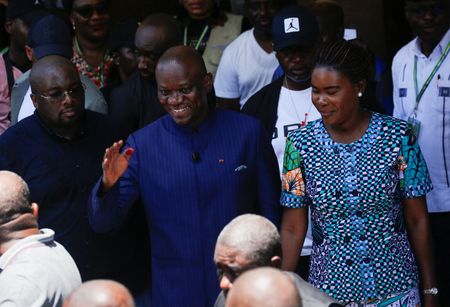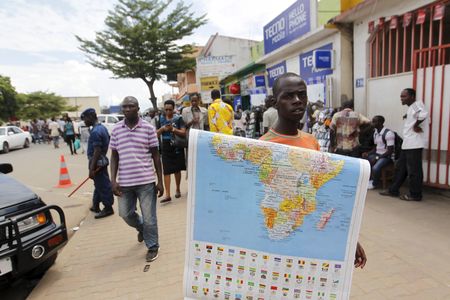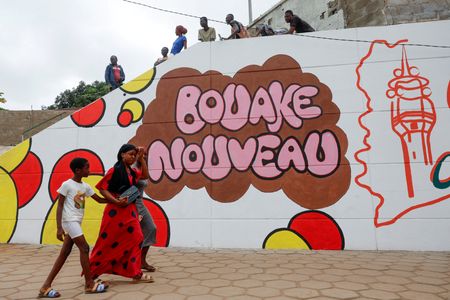By Gerauds Wilfried Obangome and Ngouda Dione
LIBREVILLE (Reuters) -Brice Oligui Nguema, who led a coup in Gabon in August 2023, won Saturday’s presidential election with 90.35% of votes cast, according to provisional results, the Central African country’s interior minister said on Sunday.
The result cements Nguema’s grip on power 19 months after the coup ended more than half a century of rule by the Bongo family in Gabon, an oil producer with a population of around 2.5 million.
Nguema’s most prominent opponent in the eight-candidate race was Alain Claude Bilie By Nze, who was serving as prime minister under President Ali Bongo at the time of the coup.
Nze, 57, finished with 3.02% of the total, according to the provisional results announced.
Campaigning in a baseball cap bearing his “We Build Together” slogan, Nguema pitched himself as a change agent cracking down on the corrupt old guard.
He vowed to diversify the oil-reliant economy and promote agriculture, industry and tourism in a country where a third of the population lives in poverty.
Turnout was 70.40%, according to the interior ministry, far higher than the 56.65% who cast ballots in the August 2023 election that precipitated the coup.
In that contest, Bongo was named the winner for what would have been his third term, but the opposition denounced the process as fraudulent.
The coup unfolded right after the results were announced.
Investors were watching to see if Gabon, which has $3 billion outstanding in international bonds, would re-establish its democratic credentials by holding a credible election.
“Prolonged political uncertainty and fears of extended military rule have constrained Gabon’s economic growth, exacerbating the country’s budget deficit and debt levels,” said Mucahid Durmaz, senior Africa analyst at risk intelligence company Verisk Maplecroft.
“A democratically elected government with a clear mandate will be better positioned to engage with multilateral partners and to pursue fiscal reforms and debt restructuring, which are essential to establishing macroeconomic stability.”
Gabon’s economy grew by 2.9% in 2024, up from 2.4% in 2023, driven in part by infrastructure projects and increased production of commodities such as oil, manganese and timber, according to the World Bank.
Under a constitution approved last November, Nguema’s election win gives him a seven-year term, renewable once.
Though he has promised a break from the Bongo era, in which elites were accused of hogging Gabon’s oil wealth, Nguema himself has ties to the old government. He is a former aide-de-camp to Ali Bongo’s father Omar Bongo, who served as president for more than 40 years until his death in 2009.
(Additional reporting by by Robbie Corey-Boulet; Writing by Robbie Corey-Boulet and Portia Crowe; Editing by Frances Kerry and Giles Elgood)







